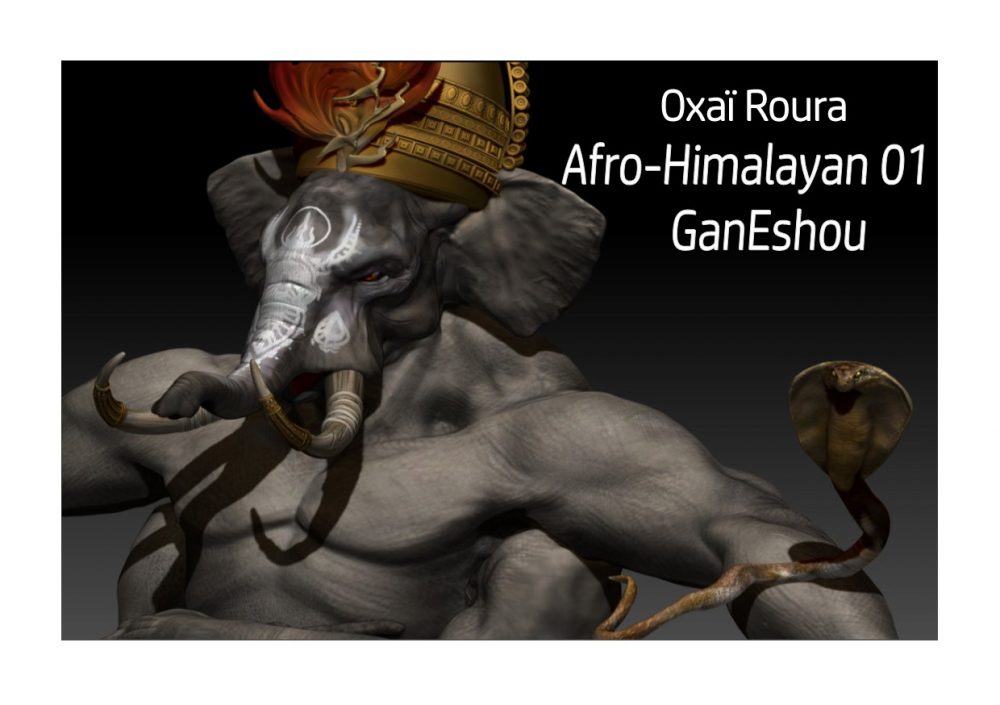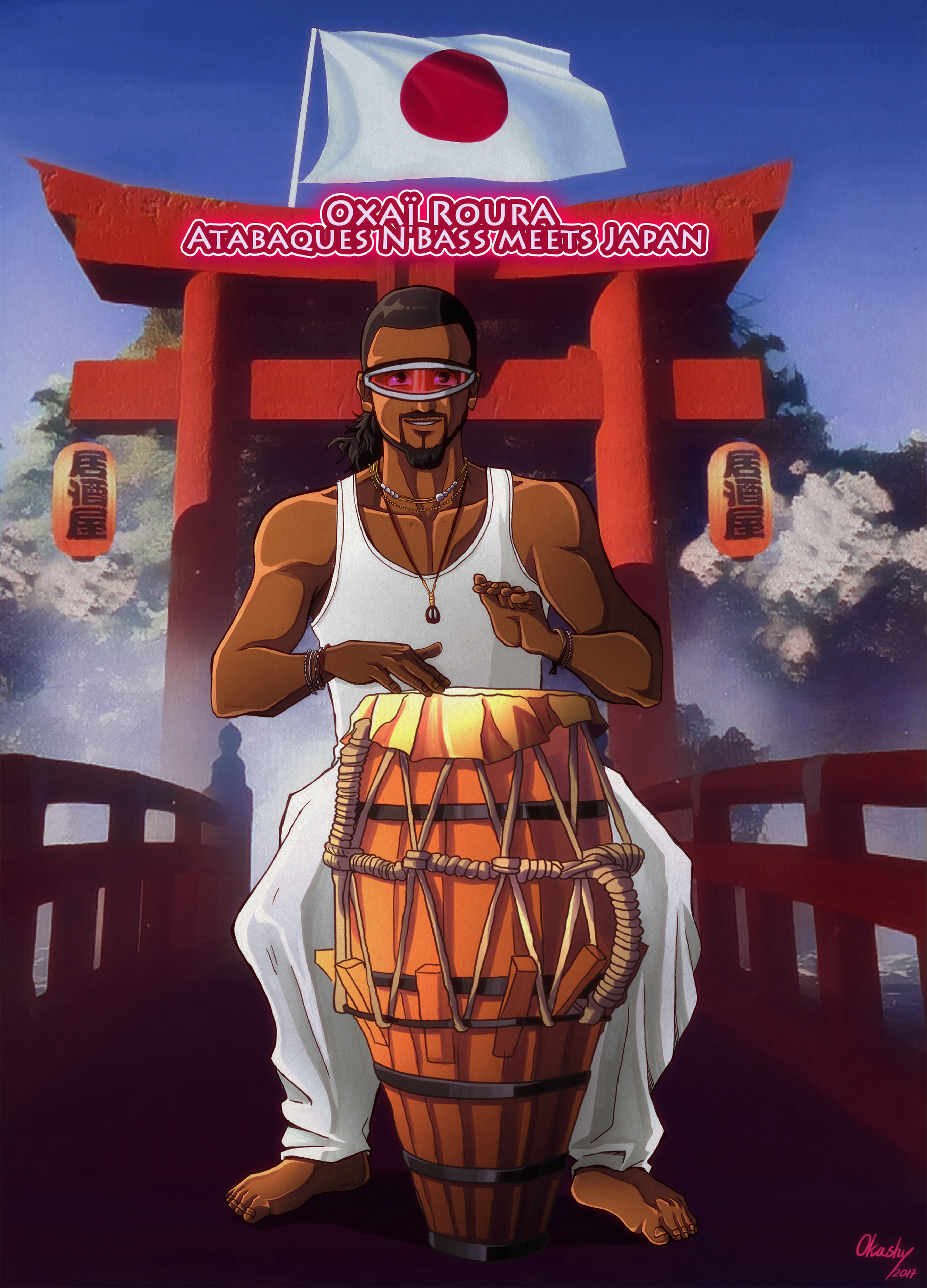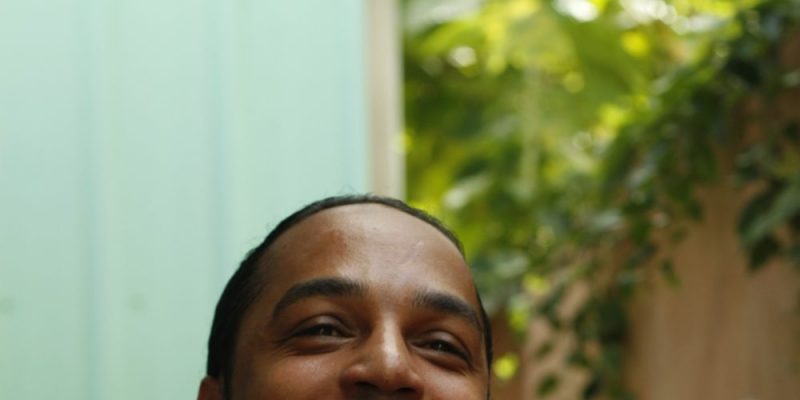Are you ready for a kind of music you’ve never heard before?
Oxaï Roura is a composer of new and unusual musical forms. He’s a percussionist, vocalist, and researcher in Ethnomusicology. We were blessed with the opportunity to interview him to find out more about his creative process, as well his thoughts on the healing power of music, his passion for percussion, using multiple languages in songwriting, and everything else that came to mind. Here’s how it went.
* * *
Hi Oxaï. It’s a pleasure to be able to interview you – thank you for your time with this!
Your music has perhaps one of the most unique sounds I’ve come across in recent years. What inspires you to create in this way, and are you a writer and composer first – melodies, concepts, instrumentation – or are you driven initially by a desire to experiment with certain sounds?
Well, 1st of all: thank you for the compliment! The words “unique sounds” are really important for me because, as an artist, I am completely focused on the idea of creating something original and unique. In fact, since the beginning of my career as a solo artist, I always tried to create a new kind of sound, new arrangements of soundwaves, new musical styles & genres. I always admired artists & musicians who try to open new ways, new doors & new perspectives. They are a big source of inspiration for me.
I’m also inspired by the mystery of life, the mystery in life; In fact, I try to use music as a tool in order to feel perceive and understand what is the true nature of our human experience. This being said, in order to answer your question as precisely as I can, I should say that my way to create this kind of sounds is intuitive. I mean sometimes I have a concept in mind, and I try to give a sonic form to it; sometimes sound just expresses itself through me and then, I search for ideas that could be combined to it. In other words, sometimes I create music as a composer, and sometimes as a kind of scientist of sound obsessed with the idea of doing new experiments & new experiences in order to find new sonic life forms…
What are the lyrics about in Afro-Himalayan 01. GanEshou? Do you find that you can express yourself in different ways depending on which language you use? Or is it about reaching different audiences?
In fact there are two layers of lyrics in this song. The 1st layer is in Sanskrit; it is a traditional Indian mantra dedicated to a god named Ganesha. It is said that this mantra helps to create a connection with this divine being; moreover, it seems that when one sings or listen to this mantra, any kind of obstacles can be dissolved.
The 2nd layer is an ancient traditional Yoruba prayer dedicated to a deity, an African god, named Eshou-Elegua (also known as Legba). In the Yoruba tradition (but also in other West African ancient ways of wisdom), this lifeform is very very important because he is the one who is able to open the doors of the path of life for human beings. In essence, the prayer asks for bad things to be neutralized (such as death, disease, accidents etc.) and good things to come in the path of life (such as good health, good money, good luck etc.). This being said, I find interesting to communicate ideas & feelings/emotions with different languages. It seems that it is possible to create different kinds of vibrations, images and effects according to the language used.
As a solo artist & as a sideman, I had opportunities to sing in many various languages (such as Malinke, English, Yoruba, Japanese, and languages from Madagascar…); I discovered to my surprise that even when sometimes I did not fully understand all what I was singing, I was able to transmit special feelings and energies to the audience with these languages (just by focusing on the main ideas contained in the songs).
But it is also true that expressing myself in different languages could help me to reach different audiences, like African & Indian audiences, who know English but also, naturally, like to hear things in their mother tongue. Furthermore, I feel that music can help us to go beyond the frontier of language; in other words, I’m deeply convinced that language is just a step in human evolution; it may be possible to create a kind of meta language, a musical language which could be understood by any human being, anywhere anytime. For example, shamans and shamanesses of different parts of the world use, during their trance, an unknown human language which is capable of healing their fellow beings, even if this language seems not to be intellectually understandable.
How important is live performance to you as an artist, and what makes for an ideal live show in your opinion – small and intimate, big and high energy, somewhere in between?
Well, live performance is important to me but I like it to be original and unpredictable. In fact, as a side man or a band member, I had the opportunity to play live many times with different kinds of bands and it was very cool indeed; but right now I am searching for new ways to perform live. For example, between 2003 and 2010, I performed live with dancers and choreographers in order to try new things.
Right now, I am trying to be in a wider cross disciplinary/interdisciplinary/transdisciplinary approach; In other words I am now in a new team made of visual artists, musicians, choreographers and dancers. Together we try to create something unique on stage, a new and different kind of artistic performance….
Concerning the ideal live show, it really depends on the music and the project. I like to play anywhere, big or small places, it does not matter. What is important is the relationship, the special link created with the audience…and the energy in the air…
What has been your greatest experience during your musical career so far?
Wow: that’s a hard one ! Well, as a composer I should say the Waan Danse Festival in New Caledonia, South Pacific. It was a huge event with a lot of different people from all over Melanesia and the Pacific. The Waan Danse Festival is a special gathering: it does take place only on every four years. It was fantastic !
This artistic experience was special also because it took place outdoor during a black moon night; there was almost no light except the one we created on stage. It was an interdisciplinary artistic experience because it was a combination of music and dance. Last but not least, the audience was both very concentrated on the show and…on fire !
Moreover, as a percussionist, I would say that my greatest experiences so far have been the encounters with great djembe masters, great masters of the drums such as Famoudou Konate (Guinea), Mare Sanogo (Mali) and Orlando Poleo (Venezuela).
Your music very powerfully depicts a variety of emotions and intensities – Human Violences, for example. The title alone seems to match up perfectly with the manic energy of the soundscape. Do you write the music first, and then add a title, or vice versa? And do you always know what the piece will be about or what you will intend for it to represent before you begin, or do you express it and then get a clearer picture of what it is that you were feeling?
Well, you know I do perceive the field of musical creation as a quantum world. Therefore it means for me that almost nothing is predictable. So, in fact sometime I get a title or, rather a combination of words, and it seems to open the doors of creativity for me; and sometime I do create some nameless music and all of a sudden I get the right title for it (at least I do hope so !).
Concerning the second part of your question, I observe that my modus operandi has changed. For example, I remember that in 2003 when I composed The Exu experience, I wanted to make a kind of concept album focused on the Orishas; I wanted to write a song about Exu, Ogum, Oxossi etc. But now, sometime I just feel I have some good music in me ready to get out; some music which could be good for the world and myself… and then, I just express it, and all these kinds of question just disappear. The things seem to fall into place naturally. The sound comes and then the words and ideas do follow.
You’re a percussionist, among other things – what was it about percussion that first drew your attention and later your passion?
I think there are several things. First, I’m obsessed with rhythm since I’m 2 or 3 years old. It’s just like that. Also, my late father was an amateur drummer when I was a very little child, so this might have influenced me more than I consciously think. Moreover, I played guitar, piano and synth quite a lot but there’s something very special in the field of percussion that I did not find anywhere else in the musical sphere: the feeling of having direct access to the true nature of sound and, maybe, to the true nature of reality. I mean when you play percussion you are in contact with one of the naked hearts of music and life: rhythm. You can eliminate a lot of useless theoretical details and then concentrate on the very core of sound. To my mind, this type of concentration can give you access to other realities (and other states of consciousness). For example, percussion can help you to perceive how sound can directly affect people and help them to get deeply healed. In other words, I love the feeling of truth & simplicity one can find into the percussive dimension… Simple moves, pure sounds, and a limitless field of possibilities…

Who did you listen to growing up, what sort of music, and who have you discovered in recent years that you think has something great going on creatively?
When I was a teenager I listened to different kinds of metal music (Thrash, Death, Grindcore…); My favorite metal band is Cynic (Progressive Metal) their album named Focus is incredible ! Then, later I seriously thought of becoming a jazz man, because creators such as John Coltrane, Steve Coleman & Thelonious monk impressed me a lot with their creations. I’ve also been deeply influenced by Minimal Music (with composers such as Steve Reich and Lamonte Young) and original electronic music (composers such as Björk and Aphex Twin). Dub Music is also another strong influence that I have…and, of course, I must not forget to mention sacred traditional music from various parts of the world !
Also, I would like to say that my growth as an artist have been influenced not only by musicians and composers, but also by other types of artists like David Lynch and Salvador Dali.
Concerning my latest musical discoveries, I think the “tradi-modern” Congolese scene is exceptional and fascinating (with artists such as Kasaï all stars and Konono Number 1). Also, the band named Oshun (Niambi Sala and Thandiwe) & The twin sisters of Ibeyi are doing a great job… I also recently discovered that there is an interesting kind of ‘electro-rap’ music coming from Papua…
Do you find creating music to be therapeutic, either in that it calms you to make new rhythms and soundscapes, or that it helps you to clarify your own thoughts and feelings about a certain topic?
Creating music is very therapeutic indeed! As a matter of fact, music is one of the most powerful therapeutic tool we do have as a humankind. Sound can cure any kind of disease. I’m sure that one day, people of the future will be cured with sounds and music. Even for some diseases that are said to be unhealable right now.
Furthermore, concerning the therapeutic side of creating music, I feel like saying that music does help me to concentrate on essential things. It’s a soothing medicine for the mind and the soul. Music also helps me to let go and transform what is called negative energy into neutral or positive energy.
You’re a researcher of Ethnomusicology – the study of music in its cultural context. What is it about this that interests you, and do you think it’s something that is at risk of fading away as the world becomes more and more connected and cultures begin to merge?
Thank you for that question: broadly speaking I’m rarely asked about ethnomusicology !
In fact, what does interest me in this science is the possibilities given to go very deep in the essential core of music. Ethnomusicology can give some keys to understand what music really is, what could the real nature of music be. Furthermore, ethnomusicology is also fascinating because it shows how human could apparently be different through time and space and, paradoxically & simultaneously, one and the same at a deeper level. Also, what I do love with ethnomusicology is the opportunity to be in contact with different ways of thinking and apprehending life and music on planet earth.
This being said, I don’t see ethnomusicology fading away in the future. Why? Because, the new connected world will create new cultures and new music and, also, very probably new ‘kinds of human communities; the new connected world may also create some new virtual ethnic groups (so to speak) to study. For example, one can see the internet as a brand new continent, with different kinds of unknown cultures to study. It may be an utopian perspective, but I think it might be an interesting subject of study for ethnomusicologists in the future.
One last thing I notice when I travel for ethnomusicological reasons is this: you’re right, on one hand it seems that we now have a kind of global musical culture all around the world; but at the same time, on the other hand, almost everywhere on the planet you can see people who are struggling to preserve the cultural & spiritual legacy which has been given to them by their ancestors. Therefore, traditional music might be a thing of the future. We might see a kind of ‘revivalism’ of traditional music and arts all over the planet in a near future. So, to my mind: ethnomusicology does have a bright future ahead.
What do you have planned for the coming months, and what can people who are interested in you and your music look out for as 2017 progresses – any live performances, new releases, collaborations?
Well, I’m now working on a new creative project ! In fact, in 2017 it will be the 14th anniversary of my very first solo project (The Exu Experience. Atabaques N’Bass. Vol 1) so I’m working on something very special; it will be a tribute to the Japanese manga culture. The name of this project is: Atabaques N’Bass meets Japan. In other words, this project will be the result of a strange encounter between an Afro-Brazilian mutant music and Japanese anime. Your readers can join me on Facebook to watch two chapters of this project (Nana & Ogum)… the third one is coming soon…

Concerning the live performances, I am now collaborating with a multi-faceted artist named Anne Sechet. For our first collaboration, we gathered an interesting team of artists who are visual artists, musicians, choreographers and dancers. We created an original artistic performance named Le bruit des étoiles (in English: Noise of the Stars) and performed together for the very first time on July the 1st 2017( in the Grimaldi Castle Museum, France). Now: I hope we’ll be called to perform in other places of the world…
Is there anything else you’d like us to know about you or your music?
Well, I have some more good and fresh news: my first ethnomusicological book has just been published and it’s now available on the internet ! The title of this book is Musiques rituelles du vodou Haïtien (in English: Ritual Music in Haitian Voodoo). For now it’s written in French only, but it will be probably translated in English soon…
And for those who would like to know more about my music, they can visit me on Reverbnation.
* * *
A big thank you again to Oxaï Roura for his time and for being so open with his answers. Stay updated with his work over on Facebook & Twitter.

